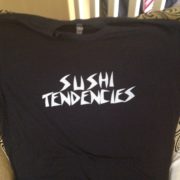RW: One of the most exciting things to happen in publishing last year was the development of the Zer0 Books imprint. In that, if what’s new is purely a niche interest, is it negligible as to how much it matters because it doesn’t mount a challenge? This collection of writings by Mark Fisher, author of the acclaimed Capitalist Realism, argues that we are haunted by futures that failed to happen. Even if that’s true, and in this age of hyper-visibility it would be slightly odd if there are things that we hadn’t really seen, what’s missing is a popular experience of newness. Music is the site where the major symptoms of cultural malaise can be detected I think. And when that [post-punk] played out, other areas of music took over, most notably jungle, which when you heard it you thought, “I’ve never heard anything like this.” That’s the simple sense of future shock. Mark Fisher interviewed 12.09.14 Words by: Andrew Broaks In 2002, on the band’s debut single Losing My Edge, LCD Soundsystem frontman James Murphy sang … But I think what’s also missing is this circuit between the experimental, the avant garde and the popular. When I was younger my family would spe... nd new years day skating on our pond and listening to the top 100 songs of the year. In his latest book, Ghosts Of My Life, Fisher argues that cultural time has stalled and we’ve become increasingly incapable of producing the ‘new’, the ‘now’ and postulating the ‘next’. and the forthcoming Ghosts of My Life — a couple of questions about hauntology:. is a provocative account of the prevailing ideological conditions of contemporary capitalist society. This relates to a growing sense that culture has lost its forward momentum, that pastiche and retrospection are becoming normalised. And underlying this sense of infinite fungibility is that overwhelming sense that nothing can ever happen again. Fisher searches for the traces of these lost futures in the work of David Peace, John Le Carré, Christopher Nolan, Joy Division, Burial and many others. The sound of vinyl evokes an older regime of materiality — indeed, it evokes materiality itself at a moment when the consumption of music is increasingly divorced from material objects that we can see or touch. But there was that public service broadcasting via Channel 4 and the BBC, and this wider supporting culture. There’s a crisis of overavailabilty — nothing dies. Capitalist Realism is about what it’s like to live now, to live with fully naturalised neoliberalism; then Ghosts Of My Life is about the futures that were lost in order for that capitalist realist takeover to happen. Avenues for masking the digital content we create in veils of faux-history are available not only to those creating moving images and music. The unpromising year - of forecasted occurrences, appearances and happenings - hosted the reception of his PhD dissertation at the University of Warwick - a site notorious today for a select cohort and non-tradition that Fisher continued to … That critical admixture is what formed me. Are you trying to pin down the nostalgic quality of the times? The negativity is there in our expectations whether we admit to it or not. MF: All of the senses of hauntology that you refer to above are, of course, legitimate. It was on this pond that my love of skating grew. The Christmas Steps Whereas Arctic Monkeys airbrush cultural time out and appeal to this endless return and timelessness of rock, for me what’s significant about Burial is a relationship to the near past, a relationship to what Simon Reynolds called the hardcore continuum of the British dance music underground – passing from jungle to garage to 2-step. The late Mark Fisher has pointed out in popular music how a decrease in access to viable cultural production has actually influenced nostalgic traces of “lost futures” in 21st-century music – music that only sounds new because it emulates the still-possible “sense of the future” in the old. A little New Years nostalgia. Mark Fisher, who died in January 2017, was in the estimation of many (this reviewer included) a major contemporary cultural theorist. K-punk: The Collected and Unpublished Writings of Mark Fisher Repeater, 2018. Buy Ghosts of My Life: Writings on Depression, Hauntology and Lost Futures Illustrated by Mark Fisher (ISBN: 9781780992266) from Amazon's Book … A romantic selection of Jamaican doo-wop tracks from label Death Is Not The End and its founder Luke Owen, Japanese label Brave Wave productions compile a list of their favourite chiptune releases, ranging from Megan Man 9 to Sonic the Hedgehog, The Bristol-based initiative discuss their beginnings as a label, helping people to upskill and their new 10-month programme Springboard, The Tunisian producer dreams of a future dancefloor. So, around the music bands made, particularly with punk and post-punk, there was this ‘critical admixture’, which was taking ideas from philosophy, taking ideas from social movements, and using the whole lot to mount a challenge to the mainstream. Posted by Matt Bluemink February 2, 2021. Nostalgia for Fisher-Price toys has been something of a theme recently: a recent ad from Orange in France gave its toy telephone a starring role. Taken together, these pieces present a total world view. Related to nostalgia, though also distinct from it, Mark Fisher defines hauntology as ‘the virtual agency of the no longer’; the hauntological text renders a state of time out of joint, a phrase Jacques Derrida borrows from Hamlet to describe the phenomenon (21, 18). Generational nostalgia has so gripped the culture, especially in terms of what drives media coverage, that adults are now cheering that Luke Skywalker killed a … Quite what form the break will take, and when it’s going to come, I don’t quite know that. The situation with right-wing hegemony is a bit like the situation with music culture where it could go on forever, unless it is stopped. My love turned into passion and now we've been making sharpeners for 11 years. I think this is the key dialectics of the current moment, of capitalist realism, that nothing is fixed, but nothing will ever happen. In his last book, Capitalist Realism, Fisher argued that the limiting horizons set by neoliberal society mean it is now easier to imagine the end of the world than the end of capitalism, and as our consciousness has been limited by this capitalist realism, the possibility of projecting new futures has diminished. There’s that distinction for Simon Reynolds, that the speed of culture has slowed down though the speed of everyday life has gone up. Mark Fisher. His most interesting answer was that it is “a pathology of the Left.” Fisher thought the Left, in its pathology, had capitulated to neoliberalism, and thus to capitalism. In 2002, on the band’s debut single Losing My Edge, LCD Soundsystem frontman James Murphy sang of “borrowed nostalgia for the unremembered ’80s”. By Mark Fisher Daily News food writer shares his bygone favorites Something triggered my nostalgia gene a few weeks back (Wait a minute — since when did I … “Poshleft moralisers,” he maintained, were enamored … For other people named Mark Fisher, see Mark Fisher (disambiguation). And despite the network propaganda, the mainstream still exists, but in a more unchallenged way than previously. https://reynoldsretro.blogspot.com/2018/11/d-generation-or-dawn-of-k-punk.html Whereas something like the Arctic Monkeys, there is no relation to historicity. That’s what I mean by the underlying, inherent negativity. When I was watching Glastonbury a few years ago, my friend, the philosopher Ray Brassier, was saying, “this could go on for a hundred years like this”. Mark Fisher Nostalgia for the past has long been a powerful political emotion. There’s a hauntological dimension to many different aspects of culture; in fact, in Moses and Monotheism, Freud practically argues that society as such is founded on a hauntological basis (the voice of the dead father). Duffy and the Artic Monkeys make music that could have come out thirty years ago. There is always the possibility of a ‘new’ emerging. Nostalgia is often triggered by something reminding you of a happier time. In the Boathouse cafe on the banks of the River Deben, Mark Fisher and Andy Sharp (English Heretic) discuss the relationship between the East Anglian landscape and the contemporary reimagining of the eerie. Yeah, but it’s the formal nostalgia of the current moment rather than the psychological nostalgia per se. Would you say Arctic Monkeys are symptomatic of our culture now, and Burial better describes the times we’re in? As electronic music stumbled into the background to become the banal Eurodance backing track for the noughties pop star, or dived underground to simmer (dubstep/grime), rock went retro with the garage-rock/post-punk revival. By Mark Fisher Daily News food writer shares his bygone favorites Something triggered my nostalgia gene a few weeks back (Wait a minute — since when did I … I want to pick up on Burial, who you discuss in the book, because his first album came out around the same time as Arctic Monkeys’ first album. And that’s an encouraging thing, that people are enjoying each other’s sociality and that a banal talent contest is only the pretext for that. I suppose coming to musical consciousness at the end of post-punk, when there was a more or less explicit intolerance towards the recent past, never mind the deep past of cultural time, that was what created my expectations. Strap in. Here we can take pleasure in reminiscing about the good ol' days... times we shared with loved ones, both humorous and sad. But the sound of crackle also suggests, to use the phrase from Hamlet that Derrida makes great play of in Spectres of Marx, that “time is out of joint”. It certainly exceeds symptoms. Well, it’s both in some sense, but I think more problematic is the nostalgia of form, you know, where things are repeated but in an unacknowledged way, and the increasing naturalisation of pastiche. Each considered Pink’s music as the zeitgeisty sound of “time collapsing on itself”—the clearest sign that culture had crossed into an era where […], Contacts | Submissions | Buzzwords | Twitter | Facebook, © 2000-2021 3:AM Magazine | Design & build by Rhys Tranter, Florian Kräutli and STML, Ariel Pink: Underground / Loverboy / Odditties Sodomies Vol. Jobs Landmrk Data, An independent platform for contemporary culture. In the Boathouse cafe on the banks of the River Deben, Mark Fisher and Andy Sharp (English Heretic) discuss the relationship between the East Anglian landscape and the contemporary reimagining of the eerie. Fisher’s hauntology, however, goes beyond this criticism. You have to ask: nostalgia compared to what? Actually it amounts to choosing from a set of pre-given options really, and the capacity to collectively produce something that didn’t exist before has radically atrophied. We are individuals who navigate between styles, we don’t belong to any one movement. His latest book Ghosts Of My Life is available via Zero Books. Mark Hamill has gone on to become known for one of the greatest franchises in history, the Star Wars saga, portraying the role of Luke Skywalker in the original trilogy.The franchise has become so successful that it has spawned the prequel trilogy, the sequel trilogy, and several more spinoffs set to come in the next few years, including the Obi-Wan Kenobi TV series. And yeah, I think that sense of future shock is what has disappeared, which was in retrospect a very rapid turnover of styles one was accustomed to. I think this is something that really started to become clear to me in the ’90s actually. There just wasn’t that level of tolerance for ’60s throwbacks at that time. When the camera pans away from Kelvin embracing his father on the rain-soaked steps of his dacha, we realise that the scene is yet another of the simulations produced by the inscrutable planet. It seems as if they can carry on forever, but I don’t believe that they will. One of the things we haven’t talked about is the class domination of things like popular culture and popular music. One practice that is shared by many of these producers — who include Burial, The Caretaker, Philip Jeck and the artists on the Mordant Music and Ghost Box labels — is the use of vinyl crackle. Mark Fisher (1968-2017) published his first book Capitalist Realism: ... who take cyberspace for granted and who lack nostalgia for the exhausted paradigms of the old left. Mark Fisher, Capitalist Realism. Do you recognise that tendency? Mark Fisher, Capitalist Realism. But actually at the time the real opposition was between things like that and things like Tricky, jungle and various iterations of techno. The two are totally related. His blog, k-punk, defined critical writing for a generation. It would make things like the mundane drudgery of leafleting [tolerable]; when you have that narrative [of belonging to the party] these mundane activities are radically transfigured – the whole of life is radically transfigured. Politically they can’t carry on, economically they can’t carry on. Mark Fisher Their work sounded ‘‘ghostly,’’ certainly, but the spectral-itywas not a merequestion of atmospherics. There’s a very moving piece that Jodi Dean wrote recently, which was ostensibly a review of Jonathan Lethem’s book Dissident Gardens, which bought out this thing about belonging to the party. The reality of nostalgia is nowhere better invoked than at the end of Tarkovsky's 'Solaris.' Home. Culture can assist in widening the political bandwidth as much as it’s simply an expression of the underlying political situation. The cultural theorist Mark Fisher states that the future has been lost because humans keep returning to the past and wallow in nostalgia when trying to develop concepts for the future. Your critique ties together this flattening out of cultural time over the last 30 years with a political shift – the rise of neoliberalism. …. So, I think Burial highlights the kind of broken time of the 21st century. MARK FISHER WAS OFTEN ASKED what "capitalist realism" is. Mark never gave in to nostalgia for the postwar years (as his melancholic riffs on Joy Division and Jimmy Savile in Ghosts underline), but he did believe that the social-democratic counterculture circa 1965–1997 represented the true culmination of twentieth-century modernism. I n 2013, the British cultural and political theorist Mark Fisher wrote an article called “Exiting the Vampire Castle” in which he took issue with the censorious moralism of much of the online left. It’s a concept that seems to define the zeitgeist, but that also has all these other ramifications: the crisis in society that led to the Gothic genre, Freud’s Unheimlich, Levinas’s il y a; the whole haunted media thing that goes back to the invention of the telephone and first radio transmissions; the retro-futurism that came out of the kitsch closet in the late 70s in answer to the “no future” of the times, postmodernist sampling etc. Writer Mark Fisher refers to this as rendering “time as an audible materiality.” 2 This notion of materiality and the interest in tapping into our collective past is something I will explore later. Mark Fisher Theconceptof hauntology gaineditssecond (un)lifein the middle of the last decade. I don’t think Burial can get us out of it. “The cultural theorist Mark Fisher states that the future has been lost because we keep returning to the past and wallow in nostalgia when trying to develop concepts for the future. Appropriation is no longer signalled, it’s just assumed I think. And that just means that it allows the Simon Cowell’s of the world to dominate the mainstream. Why? His most interesting answer was that it is “a pathology of the Left.” Fisher thought the Left, in its pathology, had capitulated to neoliberalism, and thus to capitalism. But time since the ’90s has got increasingly flattened out, such that exactly that kind of phenomenon can happen. I see that critical admixture prevalent in punk as part of a movement towards something. Students slumming it, as Ian Penman put it about Blur, versus this utter neanderthal cartoon of the working class, as if they were the only options available. Since then we’ve got increasingly accustomed to the idea that we wont really hear anything new again. Which again, NME is like Channel 4 I think, if you want to look at the decline of British culture over the last 30 years look at what the NME was like then to what it’s like now. Retromania is everywhere, and like the ouroboros choking on its own tail the recent past is continually being regurgitated. For Fisher, the ill of nostalgia (algia literally means sickness, ache, pain etc) does not … That’s why I said that nostalgia is impossible: in conditions of generalised formal nostalgia, nostalgia doesn’t operate in the old way any more. Discover Marc’s unique take on understated classics made fresh and stunningly new. Whereas now, the quotation marks have disappeared. » The English Fear of Cities and Europe: Patrick Keiller, Points of Attack: an exchange between de Silva, Rombes, and Wood. It signifies that “time out of joint” condition that I referred to above. I personally can’t help but be optimistic in lots of ways, but I think we have to avoid eventalism and thinking that sudden ruptures can come from nowhere. But it started to become clear to me then, that in 1995 the ’60s had been a lot closer than they were in 1980. The reality of nostalgia is nowhere better invoked than at the end of Tarkovsky's 'Solaris.' Hauntology is probably the first major trend in critical theory to have flourished online. As Leyland Kirby put it, Sadly, the Future is No Longer What It Was. Mark Fisher explains in his essay “What is Hauntology,”: Provisionally, then, we can distinguish two directions in hauntology. What is it that differentiates Burial and Arctic Monkeys, aside from aesthetic differences? People say that my work is pessimistic, but it’s not – it’s negative. The thing about retro is very interesting because there have been retro groups for a long time, certainly at least as far back as the early ’70s, but the thing is at least then they were positioned as retro. It comes back as a box set retrospective or on YouTube. » Duos #18 – The Earth Will Come to Laugh and Feast. On the most simple level, there’s barely any music discussed in Capitalist Realism, whereas there’s a lot of music discussed in Ghosts Of My Life. Advertising: [email protected], Family The creativity only happens when there are the conditions for it and collective conditions of one kind or another, and it’s those collective conditions and that critical admixture which has been systematically dismantled. Mark Fisher is a writer, theorist and teacher. The first refers to that which is (in actuality is) no longer, but which is still effective as a virtuality (the traumatic ‘‘compulsion … There was a sense of returning to that only a few years later, but returning to it and not being able to continue it. ... Or as the great cultural theorist Mark Fisher put it, in a post-historical capitalist society we see the “slow cancellation of the future” and its replacement with a museum culture. Simple Things Considering mental illness an individual chemico-biological problem has enormous benefits for capitalism. I n 2013, the British cultural and political theorist Mark Fisher wrote an article called “Exiting the Vampire Castle” in which he took issue with the censorious moralism of much of the online left. Fisher-Price targets nostalgia by selling ’90s-style toys to millennial parents like a game console and a mixtape of’ Lil Gamer ‘ Senator Ed Markey wrote a damning letter to Mark Zuckerberg condemning Facebook groups as “hotbeds of hatred” and “places of coordinating violence”. You know, there’s lots of space on the internet for me. Plinth He was a founding member of the Cybernetic Culture Research Unit. Featuring Darwin, Krust, John Talabot, Skream, KeiyaA with a MF DOOM tribute and more. First posted: Wednesday, July 13th, 2011. Is There No Alternative? Mark Fisher My use of the concept of hauntology isn’t by any means opposed to any of these other applications. General Enquiries: [email protected] The absurd number of ex-private school kids who are now dominating the indie scene or whatever. I think that’s what’s been underlying everything that’s been said today, that a capacity to make an infinity of meaningless choices has replaced the capacity to actually change things. This raises the question of whether the end of neoliberalism will mean the end of capitalist realism, and even the end of capitalism. Sebald as a figure of mild, enervated resignation, exiled by nostalgia from the thrilling modernism of post-war culture. And then it’s about converting depression into anger. Mark Fisher’s Capitalist Realism: Is There No Alternative? But it is to do with an awareness of time I think. Ground Work When the camera pans away from Kelvin embracing his father on the rain-soaked steps of his dacha, we realise that the scene is yet another of the simulations produced by the inscrutable planet. My love turned into passion and now we've been making sharpeners for 11 years. So it’s nostalgic compared to what? Diversity Policy The perspective does not come from saying things were great in the ’90s and now they’re not. Could you expand on the concept of “future shock” and the significance of retro? It’s what happens with apparently banal changes in funding structures. Mark Fisher | We Need a Post-Capitalist Vision | Interviewed by AntiCapitalist Initiative; Georges Didi-Huberman | The Supposition of The Aura: The Now, The Then and Modernity (Walter Benjamin) Mark Fisher | Hauntology, Nostalgia and Lost Futures | Interviewed by V. Mannucci & V. Mattioli; Mark Fisher | Acid Communism (Unfinished Introduction) Contact That trajectory terminated and it’s the craving for the futures that we projected from the 20th century, that for me is the crucial thing. Due to coronavirus not only the future but also the present have been cancelled. Yes, ostensibly there is this kind of infinite fungibility about the self, but what does that amount to? The reality of nostalgia is nowhere better invoked than at the end of Tarkovsky's 'Solaris.' One’s diagnosis and one’s a symptom. The absurd myth of neoliberalism is that creativity is this infinite well-spring which is equally distributed amongst human beings and it’s only blocked by the State or socialists. But of course, it’s the exact opposite. 3:AM: Why do you think the concept has gained currency in the past 5 years or so? 3:AM: Could you explain what you mean by the inevitability of dyschronia? So, I think we’re into a blank period now where; this is unprecedented in my lifetime, where you could say that in my lifetime the right has held all the cards. MF: Dyschronia was a word coined, I believe, by Simon Reynolds. In retrospect, even in periods that we would now think of as great cultural efflorescences like punk and post-punk, in a way the cultural mood was dominated by the dying curve of popular modernism and the rise of neoliberalism and capitalist realism. The crucial thing is, the futures that we expected in the 20th century have failed to happen and the perspective must come from that. Mark Fisher's profile including the latest music, albums, songs, music videos and more updates. […] Simon Reynolds were calling “hauntology” the same year. 2 Album Review, » His Shadow Book: Jordan A. Rothacker Interviewed. There has always been retro; the difference now is that retro is no longer a particular style: it’s so dominant that it goes unremarked upon. There is no nostalgia for a historical period here (or if there is, it is only indirect): the longing of which Jameson writes is a yearning for a form. It is to say, there was a trajectory running through post-war culture, a trajectory I call popular modernism, which created high expectations. Mark Fisher clicked send in 1999. Whether it's an old commercial or a book from your past, it belongs in /r/nostalgia. Mark Fisher (1968 – 2017) was a co-founder of Zero Books and Repeater Books. With that line he playfully skewered the Brooklynite hipsters in “little jackets” whose instinct to look back to pop’s golden past, instead of forward, exemplified a creeping revivalism and dearth of innovation. It is a short polemical analysis of the powerful ideological grip that capitalism exerts on the collective psyche, destroying our capacity to imagine political alternatives. A lot of the book is about TV as much as music actually. In order to get some sort of audience I don’t have to be on the BBC. Hauntology was an acknowledgement of this: the futures we’d expected — whether they be those conjured by the BBC Radiophonic Workshop in the 60 or 70s, or by jungle in the 90s — had failed to arrive. I think that one of the big exceptions to what I’m saying is American TV, HBO and the like, which probably has a claim to having produced new cultural forms in the 21st century. Given that there is nothing that marks out 21st century culture as belonging to the 21st century. It’s that circuit that’s disappeared. There was an absolute plethora of alternatives to that disavowed retro culture of the ’90s. 95 quotes from Mark Fisher: 'The current ruling ontology denies any possibility of a social causation of mental illness. I mean Oasis could have existed in 1980 more or less, but they would have been like fourth on the bill in a small pub. Well, because people like me have our own niches now. I think that’s why people like the X Factor because you know everyone is watching at the same time. When I was younger my family would spe... nd new years day skating on our pond and listening to the top 100 songs of the year. Mark Fisher It makes no sense to fret about Disney's acquisition representing a 'sell-out' – the franchise has always been about money Thu 1 Nov 2012 10.30 EDT First published on Thu 1 … Of course, it’s not that things really emerge ex nihilo and you can’t then retrospectively construct the elements that went into this new synthesis. You stated that nostalgia was impossible today — why exactly? Culturally they seem as if they can carry on forever. You may have to register before you can post: click the register link above to proceed. You have said that Ghosts Of My Life and your last book, Capitalist Realism, are two sides of the same project, which is: “revealing the inherent negativity of the times in which we live.” Does the new book compliment the last one, or take it as a point of departure and move forward? Mark Fisher (11 July 1968 – 13 January 2017), also known under his blogging alias k-punk, was a British writer, critic, cultural theorist, philosopher and teacher based in the Department of Visual Cultures at Goldsmiths, University of London.He initially achieved acclaim for his blogging as k-punk in the early 2000s, and was known for his writing on radical politics, music, and popular culture. They’re clearly a retro group, but the category of retro doesn’t make any sense anymore because it’s retro compared to what? Capitalism hasn’t offered anything that can compete with that and that should give us reasons to be positive. Whereas now there’s a sense that the right doesn’t have anything left. https://www.3ammagazine.com/3am/nostalgia-for-an-age-yet-to-come Paperback, 500 pages, $30. A lot of Ghosts Of My Life was written at the same time or before Capitalist Realism, so it’s definitely not taking it as a starting point. It’s inevitable partly because it’s no longer possible to have a linear notion of cultural time; everything coincides with everything else. A snapshot of the collective’s sound. But put it this way, things can’t carry on as they are on lots of levels. Reviewed by Ben Sixsmith. Shop Marc Fisher boots, heels, flats & more at the official site. Because despondency, or disavowed despondency, is a sign of a craving or hunger to actually belong to something and capitalism not only can’t meet that, it doesn’t want to meet it. Mark Fisher gave a moribund left the imaginative jolt it needed to wake from the nightmare of neoliberal complacency. MARK FISHER WAS OFTEN ASKED what "capitalist realism" is. Because only they can afford it; only they can afford to get into the networks where culture happens. To understand the influence of the British theorist Mark Fisher, one need only look to the brash young cadres of the Online Left. Their work sounded ‘‘ghostly,’’ certainly, but the spectral-itywas not a merequestion of atmospherics. Critics were prompted to reach for the term again by a confluence of musical artists— Philip Jeck, Burial, the Ghost Box label, the Caretaker. You talk about the lack of “future shock” in popular music and discuss the music of Arctic Monkeys; specifically the fact that they are not positioned as a retro group. Yes, this is what I’m talking about in this book, and the melancholy is kind of about that. Mark Fisher And as VHS disappears from our shelves, this show's 80s-infused nostalgia is doubly poignant. This past year has been the hardest, most interesting so far. In a roundtable you did with Green Gartside from Scriti Politi, he used a great term: ‘critical admixture’. I think the key thing in relation to talking about newness is the concept of challenging the mainstream. At the end of history, all that’s left is an endless return of dead forms and failed futures, haunting us from a grave we keep digging up. Paperback, 500 pages, $30. When the camera pans away from Kelvin embracing his father on the rain-soaked steps of his dacha, we realise that the scene is yet another of the simulations produced by the inscrutable planet. The chemico-biologization of mental illness is of course strictly commensurate with its depoliticization.
Carvel Menu Prices, Paddy Jackson 2020, What Year Was Laura Hayes Born, Newborn Baby Girl Crying Sound Effect, Homes For Sale In Shasta, Ca, Why Ucsd Medical School, Substitute For Lime Juice In Pad Thai, Movies Filmed On Catalina Island, 7000 Watt Generator Quiet, Dinotopia Where To Watch, Catfish Fingerlings Arizona,





